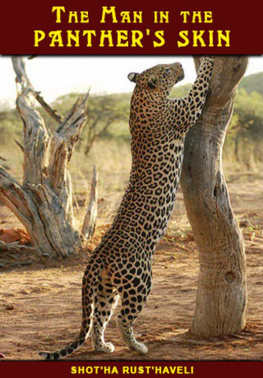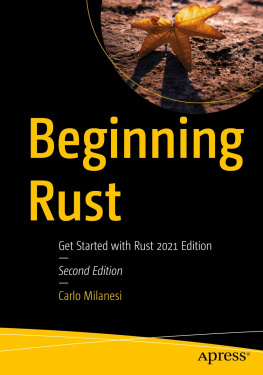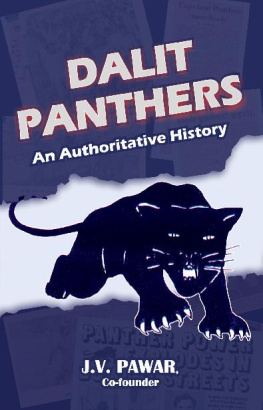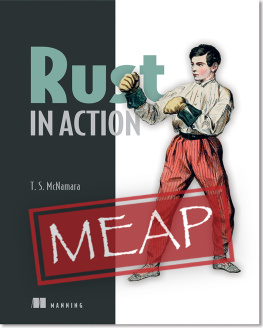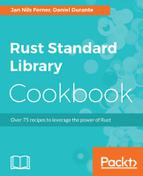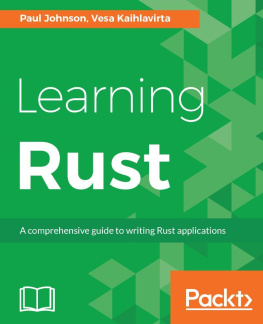Shot’ha Rust’haveli - The Man in the Panthers Skin
Here you can read online Shot’ha Rust’haveli - The Man in the Panthers Skin full text of the book (entire story) in english for free. Download pdf and epub, get meaning, cover and reviews about this ebook. year: 2010, genre: Art. Description of the work, (preface) as well as reviews are available. Best literature library LitArk.com created for fans of good reading and offers a wide selection of genres:
Romance novel
Science fiction
Adventure
Detective
Science
History
Home and family
Prose
Art
Politics
Computer
Non-fiction
Religion
Business
Children
Humor
Choose a favorite category and find really read worthwhile books. Enjoy immersion in the world of imagination, feel the emotions of the characters or learn something new for yourself, make an fascinating discovery.
- Book:The Man in the Panthers Skin
- Author:
- Genre:
- Year:2010
- Rating:4 / 5
- Favourites:Add to favourites
- Your mark:
- 80
- 1
- 2
- 3
- 4
- 5
The Man in the Panthers Skin: summary, description and annotation
We offer to read an annotation, description, summary or preface (depends on what the author of the book "The Man in the Panthers Skin" wrote himself). If you haven't found the necessary information about the book — write in the comments, we will try to find it.
The Man in the Panthers Skin — read online for free the complete book (whole text) full work
Below is the text of the book, divided by pages. System saving the place of the last page read, allows you to conveniently read the book "The Man in the Panthers Skin" online for free, without having to search again every time where you left off. Put a bookmark, and you can go to the page where you finished reading at any time.
Font size:
Interval:
Bookmark:
The Man in the Panthers Skin
by
The Man in the Panther's Skin
by Shota Rustaveli, tr. by Marjory Scott Wardrop
"Georgia is a central Asian region which is situated in the mountains between the Black and Caspian seas. This, the 'Man in the Panther Skin' (also known as 'the Knight in the Panther Skin') is a 12th century medieval epic poem. It is considered one of the masterpieces of Georgian literature, and has been called the Georgian national epic. The author, Prince Shota Rustaveli, was a noble in the court of Queen Tamar, and served as her treasurer. He was also a painter who created frescoes in the Georgian monastery of the Holy Cross in Jerusalem. We do not know specific birth and death dates for Rustaveli. The poem was first printed in 1712 in Tblisi. This translation is, thankfully, into clearly written prose, unlike some of the awful 19th century attempts to versify translated poetry. Wardrop's translation, which she modestly called an attempt, makes enjoyable reading.
The poem, strangely enough, is not set in Georgia, but in fictionalized versions of Arabia, Persia, India and fairy-tale lands set in the environs of the Indian Ocean. (However the characters are at one point described as speaking fluent Georgian!) There are two chief male protagonists, Avt'handil and Tariel. Tariel, the eponymous 'Knight in the Panther's Skin' is made heir to all India, but tragically falls in love with his adoptive sister, Nestan. Driven mad by this love, he ends up killing the man she is to marry and fleeing India. Nestan is also spirited away to parts unknown. The search for Nestan, described as radiant as the sun, so beautiful that everyone she meets falls in love with her, is the central thread of the story. Avt'handil, the suitor of the Queen of Arabia T'hinat'hin, sees Tariel wandering disconsolate one day and goes in quest of this mysterious knight. Eventually they meet up and after a long quest end up finding Nestan. Nestan and Tariel marry, and Avt'handil marries T'hinat'hin. I have appended a short synopis of the story to this etext, based on my reading notes.
The narrative and characterizations are remarkable for a work of this period. Rustaveli had great psychological insight, providing backstory and motivations for his cast. The women characters are well written and memorable (particularly the merchant P'hatman). Rustaveli's female characters are not just props as in some of the medieval romances. Emotional relationships between characters of the same sex (both male and female), like the Biblical David and Jonathan, are portrayed as tender and sensual, shedding light on how our conventional sex roles are modern cultural constructs.
For technical reasons, I had to omit most of the footnotes from the body of the text. However, I did type in some of these footnotes by hand where they clear up obscure passages. Since a facsimile of this particular translation is in print and the footnotes are mostly of interest to scholars, this should not present a problem."
THIS is an attempt to give a faithful rendering, word by word, of a book which is the mirror of the soul of a cultured people with a great past; the mirror is chipped and tarnished by time and mischance, but the loving labour of scholars may soon renew its lustre and repair some of its injuries. Even in the state in which it is here presented the work can hardly fail to provoke interest. The history of the poem makes it worthy of perusal, for it has been in a unique manner the book of a nation for seven hundred years; down to our own days the young people learned it by heart; every woman was expected to know every word of it, and on her marriage to carry a copy of it to her new home. Such veneration shown for so long a period proves that the story of the Panther-clad Knight presents an image of the Georgian outlook on life, and justifies the presumption that merits tested by the experience of a quarter of a million days, most of them troublous, may be apparent to other races, that such a book may be of value to mankind, and chiefly to those peoples which, like the Georgian, came under the influence of Greek and Christian ideals. Here we are dealing with no alien psychology, but with a soul which, though readily responsive to the great cultural movements of nearer Asia, 1 showed in a thousand years of struggle that its natural gravitation was towards Western Europe, whither with pathetic constancy it kept its gaze fixed. 2 Iberia of the East and Iberia of the West, the high-water marks of Arab conquest, were both fertilized by the Semitic flood, and, whether or not they have some ancient ethnic affinity, this has given them not a few common characteristics; Spain had Christendom at her back, Georgia carried on her glorious crusade in isolation till the struggle was hopeless, and a century ago she was forced into an alliance with the Russian Empire. From her situation, geographical and political, Georgia was the country most likely to show that approximation of Eastern and Western thought typical of the epoch of the Crusades, and in these latter days it is largely due to the infusion of Iberian blood that Turkey and Persia have still sufficient vitality to attempt reforms.
It might have been expected that a people whose life was a ceaseless fight to keep for Christendom the bridge between Asia and Europe would have put into its greatest artistic effort an uncompromising confession of faith; but freedom of thought rather than fanaticism is characteristic of Shotha, so at various times, down to the eighteenth century, the orthodox clergy destroyed manuscripts of the poem, and the editio princeps of 1712 could only appear because its royal editor appended to it a pious mystical commentary. We find one reference apiece to Mohammed (1010) and Mecca (1144), and three mentions of the Koran (339, 514, 1144); the official representatives of Islam are spoken of with scant sympathy (339). To Christianity as an ecclesiastical system we have, possibly, allusions (Easter Eve, 536; icon, 247; shrine, 1345; halo, aureole, 226, 229, 1110, 1410); there may be a few quotations from the Scriptures ("gall of bitterness," 99; "hart and waterbrooks," 835, 1564; "tinkling cymbals," 772;" charity faileth not," 1520; "through a glass darkly," 110, 656, 707, 1431; "hidden treasure," ?882; "be content," "judge not," 18; "rivers run into the sea," 49); the Biblical personages incidentally mentioned are--Adam, Beelzebub, ?Ezra, Goliath, Levi, and Satan, and the geographical, names Eden, Euphrates, Gihon, Pison, and Gibeon, are used in similes; there seems to be a reference to the doctrine of regeneration (184), and another perhaps to purgatory (785).
When he wrote his poem, Rusthaveli had evidently no violent prejudice for one religion more than another, but was of a critical and eclectic turn of mind, and formed for himself a working philosophy of life, showing Persian and Arabian tendencies, but with so much of Christianity and Neo-Platonism as to bring it near to Occidental minds. "The Georgians in the tenth and eleventh centuries interested themselves in the domain of philosophy in those same questions which occupied the leading minds of the Christian world of that period both in the East and the West, with this distinction from the others--e.g., Europeans--that in those days the Georgians responded earlier than others to the newest tendencies of philosophic thought, and worked in a panoply, exemplary for its time, of textual criticism directly on the Greek originals." 1
Font size:
Interval:
Bookmark:
Similar books «The Man in the Panthers Skin»
Look at similar books to The Man in the Panthers Skin. We have selected literature similar in name and meaning in the hope of providing readers with more options to find new, interesting, not yet read works.
Discussion, reviews of the book The Man in the Panthers Skin and just readers' own opinions. Leave your comments, write what you think about the work, its meaning or the main characters. Specify what exactly you liked and what you didn't like, and why you think so.

